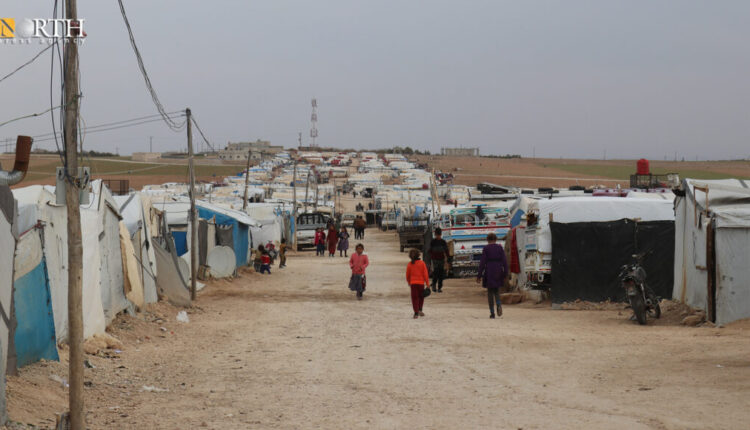
By Fattah Issa
MANBIJ, Syria (North Press) – Approximately 5,000 IDPs currently reside in two neighboring camps near the village of Rasm al-Akhdar, east of the city of Manbij in northern Syria. These IDPs face challenging conditions during winter as they live in worn-out tents and experience shortage in food, heating materials, and healthcare.
The New Eastern Rasm al-Akhdar camp houses 712 families, mostly from the towns of Dayr Hafir and Maskanah in the countryside of Aleppo. Meanwhile, 435 families reside in the old camp.
Both camps are run by a joint administration affiliated with the Autonomous Administration of North and East Syria (AANES). The joint administration provides families with bread and household gas cylinders, and oversees a clinic and two schools. Furthermore, it ensures access to clean drinking water, and proper waste disposal.
The NGOs working in the camps only distribute food vouchers, which the IDPs consider insufficient. The administration acknowledges its limited resources, which are provided by the AANES Social Affairs and Labor Committee in Manbij.
Hussein al-Shahoud, a 68-year-old resident of Rasm al-Akhdar camp, expressed that the tents, as well as the blankets and sponge mattresses provided four years ago, have become worn-out over time.
He added that neither the camp administration nor the NGOs operating there have provided families with waterproof covers, which are essential to shield families from rain. Each cover costs 2 million SYP ($140), an amount that the majority of families cannot afford.
No entity has provided heaters, heating fuel, or winter clothing to the camp residents in both camps, according to al-Shahoud.
Darwish al-Ali, 50, another camp resident, believed that increasing the value of each food voucher from $11 per resident to $25 would adequately fulfill the basic needs of the families.
The United Nations World Food Program (WFP) announced on Dec. 4 that it will suspend its primary food assistance program throughout Syria, starting from the beginning of 2024, citing severe funding shortages.
While the WFP plans to maintain smaller aid initiatives, such as a school meals program and projects aimed at rehabilitating Syria’s irrigation systems and bakeries, the reduction in their main assistance program raises concerns about the worsening food crisis in the country.
Al-Ali says that he has to cover the expenses for bread, electricity, heating fuel, as well as costs for medicines and medical treatments.
The cost of electricity provided in the camp is one dollar per month per ampere, but recently, due to fuel shortages, electricity supply hours have been reduced from six to four.
Yasser Misto, co-chair of the Rasm al-Akhdar camp, agrees with the IDPs on the severe shortage of support provided by the NGOs for the camp.
Misto attributes the camp administration’s inability to meet the requests and needs of the camp’s residents, such as securing new tents, to the scarcity of available resources.
The administration asserts that the NGOs operating in the camp are obliged to supply waterproof covers for the worn-out tents, ensuring protection for families from rain and cold. In addition, there is an urgent need to augment food rations to adequately address the needs of the residents.
